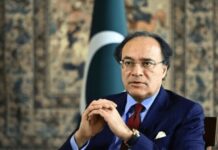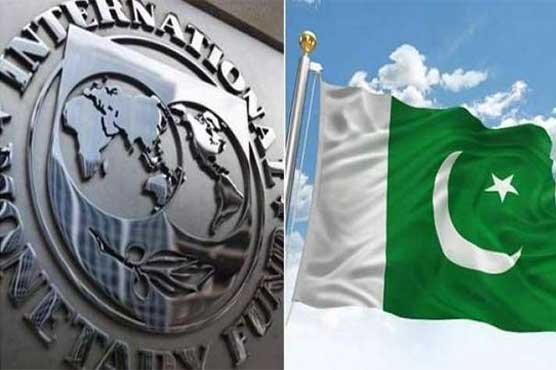—IMF official says programme to support country’s growth by reducing imbalances, improving business environment
ISLAMABAD: The Pakistani authorities and the International Monetary Fund (IMF) team have reached a staff level agreement on economic policies that could be supported by a 39-month Extended Fund Arrangement (EFF) for about US$6 billion, said a statement issued on Sunday.
Ernesto Ramirez Rigo, who is heading the IMF mission to Islamabad to discuss an economic support programme for Pakistan, said: “This agreement is subject to IMF management approval and to approval by the executive board, subject to the timely implementation of prior actions and confirmation of international partners’ financial commitments.”
He went on to say that the programme aims to support the authorities’ strategy for stronger and more balanced growth by reducing domestic and external imbalances, improving the business environment, strengthening institutions, increasing transparency, and protecting social spending.
“Pakistan is facing a challenging economic environment, with lackluster growth, elevated inflation, high indebtedness, and a weak external position,” Ernesto said, adding, “This reflects the legacy of uneven and procyclical economic policies in recent years aiming to boost growth, but at the expense of rising vulnerabilities and lingering structural and institutional weaknesses.”
He went on to say that the authorities recognise the need to address these challenges, as well as to tackle the large informality in the economy, the low spending in human capital, and poverty.
“In this regard, the government has already initiated a difficult, but necessary, adjustment to stabilise the economy, including thorough support from the State Bank of Pakistan,” he said. He added that these efforts need to be strengthened and decisive policies and reforms, together with significant external financing are necessary to reduce vulnerabilities faster, increase confidence, and put the economy back on a sustainable growth path, with stronger private sector activity and job creation.
“The EFF aims to support the authorities’ ambitious macroeconomic and structural reform agenda during the next three years, which includes improving public finances and reducing public debt through tax policy and administrative reforms to strengthen revenue mobilisation and ensure a more equal and transparent distribution of the tax burden,” Ernesto said.
At the same time, a comprehensive plan for cost-recovery in the energy sectors and state-owned enterprises will help eliminate or reduce the quasi-fiscal deficit that drains scarce government resources, he added.
The IMF official further said that these efforts will create fiscal space for a substantial increase in social spending to strengthen social protection as well as in infrastructure and human capital development. “The modernisation of the public finance management framework will increase transparency and spending efficiency,” he added.
Provinces are committed to contribute to these efforts by better aligning their fiscal objectives with those of the federal government, Ernesto pointed out, stressing that the forthcoming budget for FY2019/20 is a first critical step in the authorities’ fiscal strategy.
“The budget will aim for a primary deficit of 0.6 per cent of GDP supported by tax policy revenue mobilisation measures to eliminate exemptions, curtail special treatments, and improve tax administration,” he said.
This will be accompanied by prudent spending growth aimed at preserving essential development spending, scaling up the Benazir Income Support Program and improve targeted subsidies, with the goal of protecting the most vulnerable segments of society, he added.
The IMF official, who was in Pakistan from April 29 to May 11, said, “The State Bank of Pakistan will focus on reducing inflation, which disproportionately affects the poor, and safeguarding financial stability.”
He added that a market-determined exchange rate will help the functioning of the financial sector and contribute to a better resource allocation in the economy. “The authorities are committed to strengthening the State Bank of Pakistan’s operational independence and mandate,” he added.
“An ambitious structural reform agenda will supplement economic policies to rekindle economic growth and improve living standards,” Ernesto said. He added that the priority areas include improving the management of public enterprises, strengthening institutions and governance, continuing anti-money laundering and combating the financing of terrorism efforts, creating a more favorable business environment, and facilitating trade.
“To improve fiscal management the authorities will engage provincial governments on exploring options to rebalance current arrangements in the context of the forthcoming National Financial Commission,” he added.
Earlier on Friday, it was reported that the negotiations between Pakistan and IMF remained inconclusive as both sides decided to continue their discussions for two more days. Progress between the two sides remained positive and the negotiations would reportedly continue till Sunday.
Media reports had earlier stated that Pakistan and IMF may strike a $7bn-$8bn bailout deal after the end of bilateral talks on Friday.
According to reports, the IMF had expressed reservation over the draft agreement of loan programme with Pakistan. The Pakistani side assured the team of addressing its reservations.
However, it was reported that the deal may face a further delay if the incumbent government fails to satisfy the IMF. As per the IMF’s conditions, electricity prices would start increasing from July 1 while the country would withdraw tax exemptions amounting to Rs700 billion within two years.
The reports, quoting sources, further revealed that the government would reduce subsidies and take Rs340 billion from consumers in the energy sector, adding that the prices of gas could be raised in the second phase.
























Oh so this is new Pakistan 😂 .however Asad Umer gone is positive sign for Pti.
Pakistan needs around $2 Billion monthly and not yearly, ($6 Billion to spread over 3 years), the amount is peanuts, why not just catch hold of the crooke’s in Zardari & the Sharif’s brothers and ask them to pay for all the money they looted in the last 30 years during their combined tenure’s rather than to beg for with the IMF.